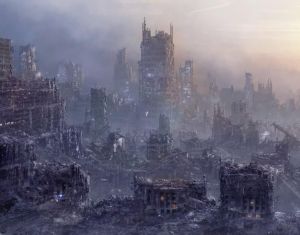For this week’s Flashback Friday, I once again welcome back author, J. L. Forrest, here for a guest post on how dystopias influenced him (and others) as writers.
Two weeks ago, from a science-fiction writer’s point of view, I explored the inherent tension between our society’s technological advancements and our social quagmires. Technology outpaces our legal systems, cultural mores, and collective conscience. We struggle globally with irrationality, superstition, racism, sexism, theism, and other isms we’d do better to lose in a rationalist, humanist, technologically advancing culture.
 For this week’s Flashback, I’d like to examine the pessimisms of eras past. Dystopias are easier to imagine than utopias, and each generation envisions its own ultimate destruction, often on solid premises. It never behooves us to take our challenges for granted, of course, but what can we expect from this era’s malaise, as compared to the glooms of the past?
For this week’s Flashback, I’d like to examine the pessimisms of eras past. Dystopias are easier to imagine than utopias, and each generation envisions its own ultimate destruction, often on solid premises. It never behooves us to take our challenges for granted, of course, but what can we expect from this era’s malaise, as compared to the glooms of the past?
In the 1960s we were suppose to die by population explosion; in the 1970s, through massive loss of global resources; in the 1980s, by acid rain and fallout; in the 1990s, pandemics of disease in a globalized world; now, global warming. Each threat was (and is) largely true, but in each case we have also experienced counter-influences which, at least so far, keep the Earth and the human race alive. Though perhaps the fear of each threat has faded, through time, from public awareness, many still loom over us in some way or another.
Yet the rate of population growth, while high, has continually slowed since the 1960s. In the so-called developed parts of the world, resource use has slowed dramatically (Sweden, for example, now buys other countries’ refuse). While pollution has skyrocketed, quite literally, in China and has remained high in Southeast Asia and South America, it has conversely plummeted in North America, Europe, Japan, South Korea, Australia, and Europe; just last month, Germany reduced its peak coal usage by thirty percent, the wintertime energy use offset almost entirely by wind turbines. Can we avert disaster due to climate change? Some believe we can; others are more pessimistic.
We can’t thank technological silver bullets for the last century’s better turns; in each case, both technological and social advancements were necessary. Population-growth rates have dropped mostly because of improved education and increased freedom for women, aided by access to the technologies of better healthcare and birth control. Similarly, each of the other twentieth-century bugaboos have, so far, been averted at least as much because of changes in human culture, not because of technological improvements alone. Moreover, these changes correlate to a world of greater tolerance and awareness. It’s not all bad news; while we continue to face monumental challenges, there’s also hope.
Does any of this relate to writing and science fiction? Dystopias have their place; they’re fun to write and to read. They teach through apocalyptic warning (and no one schooled us better than Philip K. Dick). But science fiction can do so much more. With conflict, with real tension, with challenges, science fiction can show hope, as well. I prefer the overarching hope of Arthur C. Clarke or Ursula K. Le Guin, not Pollyanna hopes, but optimism borne of humane intelligence, the overcoming of great obstacles with great integrity.
I encourage more writers to consider whether their own work is fundamentally pessimistic or optimistic, though of course the lines often prove hard to draw. Orson Welles wrote,
If you want a happy ending, that depends, of course, on where you stop your story.”
History has taught us that we shouldn’t take anything for granted, but also that things are often not as hopeless as they first appear. Science fiction is, often, about smart people doing smart things; let’s show the world how such protagonists overcome intractable challenges, in the past and present, to forge a better future.
(Image pulled from Pinterest with no credit listed, but used under Fair Use. If you know who I can credit, please let me know!)


raven_oak Thank you! Looks great.
@wordforrest raven_oak No problem! It’s a great article! 🙂